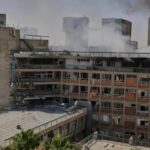The Israeli military has launched a direct and high-impact strike on Iran’s Arak heavy water reactor, a key site in Tehran’s nuclear infrastructure, as part of an intensifying campaign to dismantle the Islamic Republic’s atomic program. This strike marks the seventh consecutive day of Israeli operations targeting Iran’s nuclear and military facilities.
The Israeli Defense Forces (IDF) confirmed the Arak facility was hit early Thursday morning, describing the mission as “a strategic necessity to neutralize nuclear threats.” Simultaneously, another wave of airstrikes targeted the Natanz uranium enrichment complex, long suspected of housing advanced centrifuges for enriching uranium to weapons-grade levels.
IDF Issues Pre-Strike Warning
In a rare move, the IDF issued a warning ahead of the Arak strike, advising civilians in nearby areas to evacuate due to the potential for radioactive fallout or structural damage. Iranian state media confirmed the explosion at the Arak facility but denied any radiation leaks, stating “damage is being assessed.”
Satellite images and preliminary analysis suggest the main heavy water production infrastructure suffered direct hits, potentially setting back Iran’s nuclear capabilities by years. Military analysts estimate the Arak reactor, which was once redesigned under the 2015 Iran nuclear deal, had returned to high-capacity activity over the last 18 months following Iran’s withdrawal from deal obligations.
Widening Scope: Dozens of Targets Hit
The airstrikes on Arak and Natanz were part of a broader overnight campaign that reportedly involved more than 40 targets across Iran, including missile depots, drone manufacturing facilities, and air defense bases.
IDF spokesperson Lt. Col. Daniel Hagari said:
“These strikes are not about escalation, they are about prevention. The Iranian regime has crossed a red line in pursuing a nuclear bomb and threatening our cities. We will not allow that to happen.”
Iran Vows Retaliation
Iran’s Revolutionary Guards have vowed “swift and punishing retaliation,” accusing Israel of crossing into “open warfare.” Supreme Leader Ayatollah Ali Khamenei chaired an emergency security meeting in Tehran and warned that “Zionist aggression will be avenged with equal force.”
Iranian state media also reported that military units have been placed on highest alert, with missile units moved closer to the western border and new troop deployments near sensitive sites.
International Alarm and Diplomatic Fallout
The United Nations Security Council is expected to convene an emergency session in New York today. Several world powers, including China, Russia, and France, have issued statements urging both sides to de-escalate and return to diplomatic channels.
The United States, while affirming Israel’s right to self-defense, has reportedly urged restraint. U.S. officials have privately confirmed that Washington was not given prior notice of the Arak strike.
Why Arak Matters
The Arak heavy water facility is not used for uranium enrichment but is crucial for producing plutonium an alternative pathway to building nuclear weapons. The original reactor design would have yielded enough plutonium for at least one nuclear weapon per year. Though Iran claimed it had reconfigured the plant post-2015, recent intelligence assessments suggest reactivation of high-capacity capabilities.
Nuclear experts say this Israeli strike represents a major blow to Iran’s dual-track nuclear ambitions.



